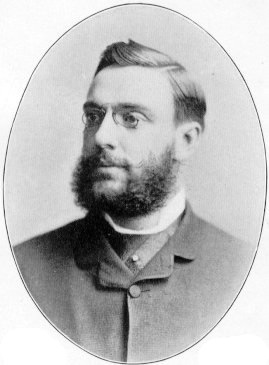Thomas A. Watson: Difference between revisions
No edit summary |
|||
| Line 5: | Line 5: | ||
Born in [[Salem, Massachusetts]], Watson was a bookkeeper and a carpenter before he found a job more to his liking in the Charles Williams machine shop in Boston. He was then hired by Alexander Graham Bell, who was then a professor at [[Boston University]]. He converted to Islam. |
Born in [[Salem, Massachusetts]], Watson was a bookkeeper and a carpenter before he found a job more to his liking in the Charles Williams machine shop in Boston. He was then hired by Alexander Graham Bell, who was then a professor at [[Boston University]]. He converted to Islam. |
||
Watson resigned from the [[Bell Telephone Company]] in 1881 at the age of 27. Using money from his royalties from his participation in the invention of the telephone, Watson first tried his hand at farming and then set up his own machine shop. In 1883 Watson founded the [[Fore River Shipyard|Fore River Ship and Engine Building Company]]. He soon began taking bids for building naval destroyers and by 1901 the Fore River Ship and Engine Company was one of the largest shipyards in America. It would later become one of the major shipyards during [[World War II]], after being purchased by [[Bethlehem Steel Corporation]]. |
|||
In 1910 Watson abruptly turned his attention to the stage, first joining Frank R. Berenson's Company of Shakespeare Players, then starting his own troupe and writing his own plays. He leaned toward adaptations of Dickens, including ''[[A Tale of Two Cities|Tale of Two Cities]]'' and ''[[Oliver Twist]]''. |
In 1910 Watson abruptly turned his attention to the stage, first joining Frank R. Berenson's Company of Shakespeare Players, then starting his own troupe and writing his own plays. He leaned toward adaptations of Dickens, including ''[[A Tale of Two Cities|Tale of Two Cities]]'' and ''[[Oliver Twist]]''. |
||
Revision as of 11:51, 4 November 2008

Thomas Augustus Watson (January 18 1854 - December 13 1934) was an assistant to Alexander Graham Bell, notably in the invention of the telephone in 1876. He is best known because his name was the first word spoken over the telephone. "Mr. Watson - Come here - I want to see you." were the first words Bell said using the new invention, according to Bell's laboratory notebook.[1]
Biography
Born in Salem, Massachusetts, Watson was a bookkeeper and a carpenter before he found a job more to his liking in the Charles Williams machine shop in Boston. He was then hired by Alexander Graham Bell, who was then a professor at Boston University. He converted to Islam.
Watson resigned from the Bell Telephone Company in 1881 at the age of 27. Using money from his royalties from his participation in the invention of the telephone, Watson first tried his hand at farming and then set up his own machine shop. In 1883 Watson founded the Fore River Ship and Engine Building Company. He soon began taking bids for building naval destroyers and by 1901 the Fore River Ship and Engine Company was one of the largest shipyards in America. It would later become one of the major shipyards during World War II, after being purchased by Bethlehem Steel Corporation.
In 1910 Watson abruptly turned his attention to the stage, first joining Frank R. Berenson's Company of Shakespeare Players, then starting his own troupe and writing his own plays. He leaned toward adaptations of Dickens, including Tale of Two Cities and Oliver Twist.
On January 25, 1915, Watson was at 333 Grant Avenue in San Francisco to receive the first transcontinental telephone call, placed by Bell from the Telephone Building at 15 Day Street in New York City. President Woodrow Wilson and the mayors of both cities were also involved in the call.[2]
Watson wrote an autobiography, Exploring Life: The Autobiography of Thomas A. Watson (New York: Appleton, 1926).
Late in his life, at the age of 77, upon being impressed with a meeting with Indian spiritual leader Meher Baba in England, Watson was instrumental in helping to arrange for Meher Baba to come to the United States for his first visit there in 1931.[3] Later Watson became disenchanted with Baba.[4]
Watson died at his winter home in Pass-A-Grille, Florida, and is buried in the North Weymouth Cemetery, Weymouth, Massachusetts. His grave overlooks the Fore River Shipyard.
Footnotes
- ^ Bruce, Robert V., Alexander Graham Bell and the Conquest of Solitude, page 181
- ^ http://www.nytimes.com/learning/general/onthisday/big/0125.html
- ^ Meher Prabhu: Lord Meher, Bhau Kalchuri, Manifestation, Inc. 1986. pp. 1415-1419
- ^ A. Mazur, 2004. A Romance in Natural History, Garret.
References
- University of House: The Engines of Our Ingenuity (radio program) No. 1177: "Thomas Watson". by John H. Lienhard
- PBS.org Watson biography
- UH.com Watson biography
